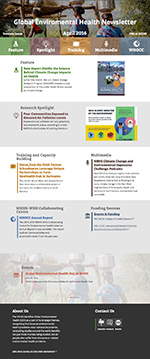
Mission Statement
The NIEHS vision, presented in the Strategic Plan for 2025-2029, is to “research how the environment affects biological systems across the lifespan and to translate this knowledge to reduce disease and promote human health.”
NIEHS identifies Global Environmental Health (GEH) as a part of its strategic themes, recognizing that because environmental health problems cross national boundaries, conducting studies around the world benefits not just those in areas being studied, but all people who suffer from the same or related environmental health problems. The inclusion of GEH continues a tradition of NIEHS global leadership and collaboration on solving the most pressing environmental health problems and improving the lives of the most vulnerable populations, both in the United States and around the world.
Global Environmental Health may be defined as:
Research, education, training, and research translation directed at health problems that are related to environmental exposures and transcend national boundaries, with a goal of improving health for all people by reducing the environmental exposures that lead to avoidable disease, disabilities and deaths.
Goals
The Global Environmental Health Program assists NIEHS in achieving its goals in three areas:
Global Environmental Health Research:
Public health improvements must be based on solid scientific understanding of population exposures and their effects. NIEHS, through its global research on health effects and exposure assessment, increases scientific knowledge and understanding of both adverse and beneficial health effects from environmental conditions, with special emphasis on effects on populations in low- and middle-income countries.
Global Environmental Health Translation:
Advances in scientific knowledge must be translated into information that leaders, decision makers, and individuals can understand and use to inform the design and implementation of health protection and promotion actions. NIEHS, through its research translation and outreach activities, aims to improve understanding of global environmental health issues in key target audiences.
Global Environmental Health Scientific Capacity:
NIEHS continues a decades-long commitment to improving the ability of countries around the world to study and solve their specific environmental health problems. We do this by supporting the training of international scientists, both on our campus and around the world; partnering with institutions in other countries to share expertise and maximize resources; and working to improve the scientific knowledge base in other countries by disseminating scientific information on environmental health where the burden of environmental disease is greatest.
Special Topics
NIEHS supports research, research translation, and capacity relevant to Global Environmental Health. For more information, click the link below:
- Climate Change & Human Health
- Climate Change and Human Health (5MB) [printable fact sheet]
Newsletter
This bimonthly online newsletter provides a snapshot of NIEHS's current GEH activities, profiles of areas of GEH research, funding information, and useful resources. By partnering with the global health and global environmental communities, in part through information exchanges like this newsletter, NIEHS hopes to build the collaborations that will lead to effective disease prevention and health promotion around the world.
NIEHS-WHO Collaborating Centre for Environmental Health Sciences
Many of NIEHS's Global Environmental Health activities are coordinated by the NIEHS-WHO Collaborating Centre for Environmental Health Sciences. Designated in September, 2013, the Collaborating Centre is a central part of the institute's vision to provide global leadership on environmental health issues.
Contacts
-

-
Trisha M. Castranio
Program Manager -
Tel 984-287-3245
[email protected] -
P.O. Box 12233Mail Drop K3-02Durham, NC 27709
-

-
Ann Liu, Ph.D., M.P.H.
Contractor - Senior Scientist -
Tel 301-496-3511
[email protected] -
31 Center DrNIHBC 31 - CLAUDE D PEPPER BUILDINGBethesda, MD 20892
- Email: [email protected]
NIEHS Global Environmental Health Program Steering Committee
-

-
Stephanie J. London, M.D., Dr.P.H.
Senior Investigator -
Tel 984-287-3688
Fax 301-480-3290
[email protected]
-

-
Kimberly Thigpen Tart, J.D., M.P.H.
Senior Health Science Policy Analyst -
Tel 984-287-3326
[email protected]
-

-
Claudia Thompson, Ph.D.
Branch Chief;
Population Health Branch -
Tel 984-287-3330
Fax 919-541-4937
[email protected]
-

-
Mary S. Wolfe, M.S., Ph.D.
Deputy Director for Policy and Communication, Division of Translational Toxicology;
Director, Office of Policy, Review, and Outreach;
Acting Director, Office of Workforce Development and Operations -
Tel 984-287-3209
Fax 301-451-5759
[email protected]
Global Environmental Health Working Group
Division of Extramural Research and Training
Division of Intramural Research
National Toxicology Program
Environmental Health Perspectives
Office of the Director
Related Links
NIEHS Related Links
- Climate Change
- Climate Change and Human Health Lesson Plans
- Collaboration between the World Health Organization and the National Institute of Environmental Health Sciences: Highlights from 30 years of Partnership (1MB)
- Global Development Goals and Links to Sustainability and Health Workshop Summary
- Harmful Algal Blooms
- NIH Disaster Research Response (DR2)
- Support for International Scientists
NIH/HHS Related Links
- Climate and Health
- The Office of Climate Change and Health Equity at HHS
- Fogarty International Center
- Global Environmental and Occupational Health (GEOHealth)
- Global Health Protection and Security
Other US Government Global Health Links
- Environmental Health
- Interagency Crosscutting Group on Climate Change and Human Health
- National Integrated Heat Health Information System
- USAID Bureau of Global Health



